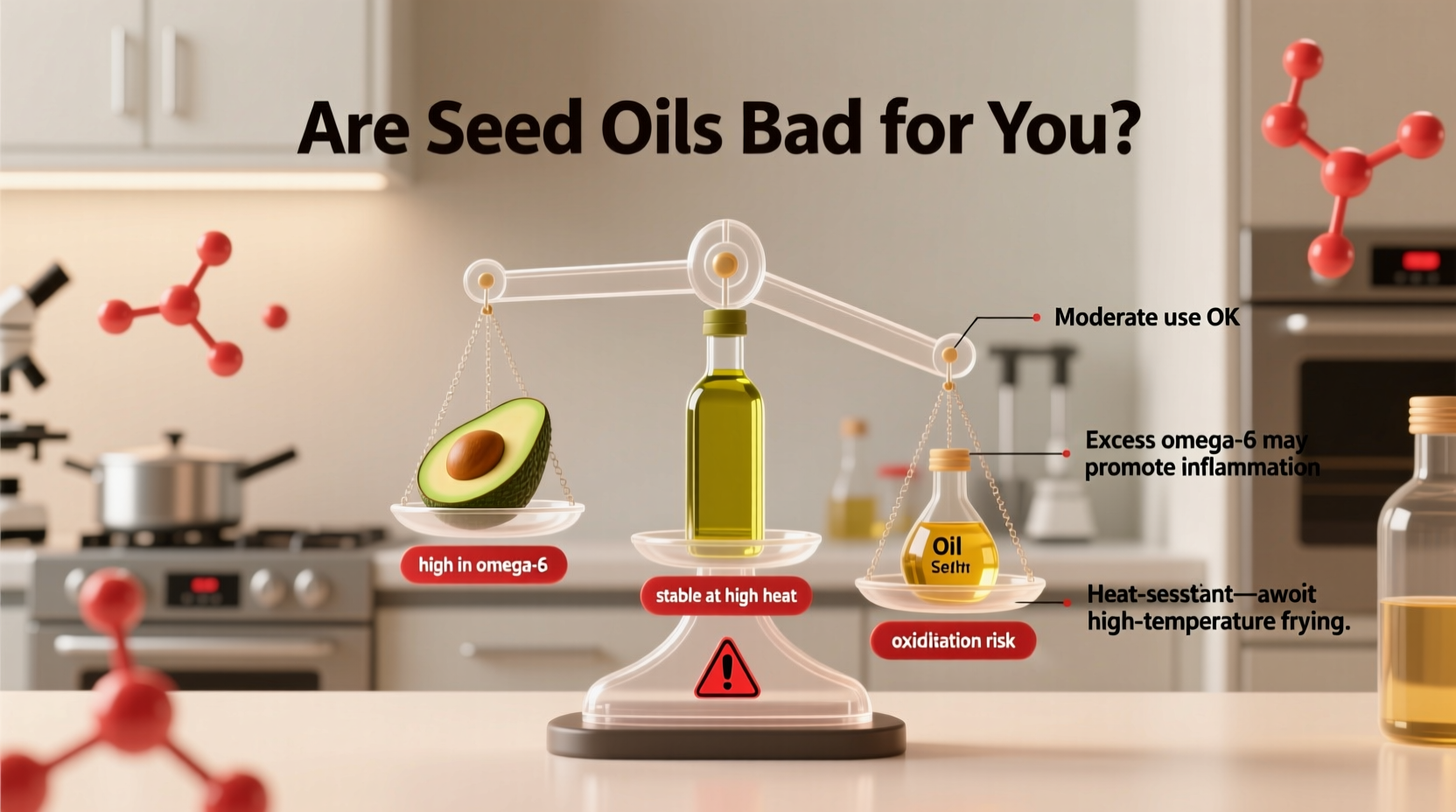Confused by the heated debate about seed oils? You're not alone. Recent claims labeling canola, sunflower, and soybean oils as "toxic" have created unnecessary fear around common kitchen staples. This evidence-based guide cuts through the noise with clear answers from nutritional science, helping you make informed choices without falling for food fads.
Understanding the Seed Oil Controversy
Why has something as ordinary as cooking oil become so controversial? The backlash against seed oils stems from several overlapping concerns that gained traction online:
- Claims that high omega-6 content promotes inflammation
- Misinformation about industrial processing methods
- Confusion between seed oils and trans fats
- Overgeneralization of studies using extremely high doses
Let's examine what credible research actually says about these concerns, starting with the fundamental question: what exactly are seed oils?
What Science Says About Seed Oil Composition
Seed oils (also called vegetable oils) are extracted from plant seeds through mechanical pressing or solvent extraction. Common varieties include:
- Canola oil (from rapeseed)
- Soybean oil
- Sunflower oil
- Corn oil
- Safflower oil
Unlike saturated fats like butter or coconut oil, seed oils are predominantly composed of unsaturated fats - both monounsaturated and polyunsaturated fatty acids (PUFAs). This composition is precisely why major health organizations recommend them for heart health.

Heart Health Research: What the Evidence Shows
The American Heart Association has consistently recommended replacing saturated fats with unsaturated fats like those found in seed oils since 2006. Their position remains unchanged in their most recent scientific advisory:
"Evidence strongly supports that consuming unsaturated fats, including both monounsaturated and polyunsaturated fats from plant sources, lowers the risk of coronary heart disease when used to replace saturated fats." - American Heart Association Scientific Statement, 2017
A comprehensive meta-analysis published in BMJ Evidence-Based Medicine reviewed 30+ clinical trials and found that replacing saturated fats with vegetable oils reduced heart disease risk by 23%. The researchers concluded that "vegetable oil intake is associated with lower coronary heart disease risk." (BMJ EBM, 2021)
Omega-6 Fatty Acids: Inflammation Myth vs. Reality
One major criticism claims seed oils cause inflammation due to high omega-6 content. While it's true that excessive omega-6 without sufficient omega-3 can promote inflammation, the reality is more nuanced:
| Fatty Acid | Primary Sources | Health Impact |
|---|---|---|
| Omega-6 (linoleic acid) | Seed oils, nuts, seeds | Essential for skin health, brain function; anti-inflammatory when balanced with omega-3 |
| Omega-3 (alpha-linolenic) | Flaxseed, chia seeds, walnuts | Anti-inflammatory, supports heart and brain health |
| Arachidonic acid | Meat, eggs (not seed oils) | Potentially inflammatory in excess |
Research from the National Institutes of Health shows that linoleic acid (the primary omega-6 in seed oils) actually reduces inflammation markers when consumed as part of a balanced diet. The problematic inflammatory compound arachidonic acid comes primarily from animal sources, not seed oils. (NIH Study, 2012)
Processing Methods: Separating Fact from Fear
Critics often highlight industrial processing methods as a reason to avoid seed oils. Let's examine the actual process:
- Crushing: Seeds are mechanically pressed to extract oil
- Refining: Removes impurities (not chemicals as often claimed)
- Deodorizing: Uses steam distillation to remove volatile compounds
While some seed oils undergo more processing than cold-pressed oils like extra virgin olive oil, the end product remains chemically stable and safe. The FDA and European Food Safety Authority have both confirmed that properly refined vegetable oils are safe for consumption. (FDA Guidance)
Practical Kitchen Guidance: Using Seed Oils Wisely
Instead of eliminating seed oils completely, focus on these evidence-based practices:
- Balance your fats: Pair seed oils with omega-3 rich foods like fatty fish, walnuts, and flaxseeds
- Choose quality: Opt for expeller-pressed or organic varieties when possible
- Don't overheat: Use high smoke point oils (like avocado or refined canola) for high-heat cooking
- Moderation matters: All fats are calorie-dense - measure portions rather than pouring freely
For everyday cooking, a combination approach works best: use extra virgin olive oil for dressings and low-heat cooking, and refined seed oils for higher-temperature applications where their neutral flavor and high smoke point shine.
Seed Oils vs. Common Alternatives: Evidence Comparison
| Oil Type | Smoke Point | Saturated Fat | Heart Health Evidence |
|---|---|---|---|
| Canola oil | 400°F (204°C) | 7% | Strong evidence supporting heart benefits |
| Extra virgin olive oil | 320°F (160°C) | 14% | Strong evidence supporting heart benefits |
| Coconut oil | 350°F (177°C) | 92% | Limited evidence; may raise LDL cholesterol |
| Butter | 302°F (150°C) | 63% | Associated with increased heart disease risk |
Source: USDA FoodData Central and American Heart Association recommendations
When Seed Oils Might Not Be Your Best Choice
While seed oils aren't inherently harmful, certain situations warrant alternatives:
- Ultra-processed food avoidance: Limit seed oils in highly processed snacks and fried foods
- Specific dietary approaches: Some therapeutic diets may restrict certain oils
- Personal sensitivities: Rare cases of seed oil intolerance exist
- Extreme consumption: Getting >10% of calories from any single oil isn't recommended
The key distinction is between seed oils themselves and how they're used in ultra-processed foods. As Harvard nutrition researchers note: "It's not the oil itself but what the oil is used for that matters most for health." (Harvard T.H. Chan School of Public Health)
Putting Seed Oils in Historical Context
Understanding the evolution of seed oil usage helps separate legitimate concerns from modern misinformation:
- 1930s: Soybean oil production begins in the US, primarily for industrial uses
- 1950s: Research emerges linking saturated fats to heart disease
- 1980s: Health organizations begin recommending vegetable oils over saturated fats
- 2000s: Low-fat diet craze leads to increased processed food consumption
- 2010s-present: Backlash against processed foods extends to seed oils
The recent anti-seed oil movement often conflates the rise of ultra-processed foods with the oils themselves, ignoring that traditional Mediterranean diets featuring vegetable oils have demonstrated heart health benefits for decades.
Your Practical Seed Oil Action Plan
Based on current evidence, here's how to navigate seed oil usage without unnecessary fear:
- Don't panic: Seed oils aren't toxic or inherently harmful
- Focus on whole foods: Prioritize minimally processed ingredients overall
- Vary your fats: Use different oils for different cooking purposes
- Read labels: Limit ultra-processed foods containing seed oils
- Balance omega-6 and omega-3: Include fatty fish and plant-based omega-3 sources
Remember that dietary patterns matter more than individual ingredients. The Mediterranean diet, which includes moderate amounts of vegetable oils, remains one of the most scientifically supported approaches for long-term health.











 浙公网安备
33010002000092号
浙公网安备
33010002000092号 浙B2-20120091-4
浙B2-20120091-4